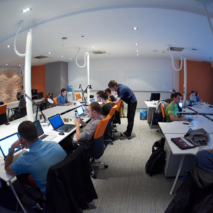The software profession is becoming increasingly popular and respected in line with technology’s growing importance to lifestyles, businesses and society. More than that, the stereotype of software people has changed markedly over time, from the socially-awkward loser to the vibrant and successful winner.
So when did coding become cool?
It wasn’t just the money – I mean, look at Bill Gates!
A popular misconception is that software got sexy on the back of high-profile, billion-dollar IPOs for the likes of Facebook and Twitter. But for all Mark Zuckerberg’s down-with-the-kids demeanour, remember that he is little more than a 21st century reboot of the achingly uncool Bill Gates. Gates is the living embodiment of making yourself unfathomably rich through software, and he’s about as hip as a stairlift. That being said, his amazing philanthropic work through the Bill & Melinda Gates Foundation earns him some serious street-cred.
No, what makes Zuckerberg and his ilk more consumable as people we’d like to know is the effect they have on our lives, not just our businesses. Gates commoditised the spreadsheet for heaven’s sake, Zuckerberg did the same for people’s social lives.
Coders and developers are portrayed as brilliant individuals in popular culture
Films and TV shows have a big say in what’s cool and what’s not. And we’ve come a long way from digesting media fare that spouts outmoded views about how techies think and act.
A great example is the Matrix film trilogy and its main protagonist, Neo character (played by Keanu Reeves). This was the first film about software and programming to abstract the action away from screenshots or a stylised interpretation of what the underlying technology looks like. Anyone remember ‘Tron’?
We even see it in old characterisations that have been brought up to date. Take Q from James Bond, the enduring ‘gadget’ man who kits out 007 for all of his big missions. The latest incarnation (played by a 32-year-old Ben Whitshaw is incredibly young for such a crucial, albeit fictional, MI6 role. This is explained by Q’s astonishing skills as a computer programmer and cyber defense wizard. And while all James Bonds since 1962 have been snoggable, Whitshaw’s Q is the first.
One part geek to one part craft?
The other driver touted for software’s sexiness is the mainstreaming of so-called geek culture. This is the cultural appropriation of ‘geeky’ items and behaviours from wearing NHS spectacles to reading comics. in reality, software people come from all backgrounds and attitudes, some of whom readily embrace the geek tag while some don’t. A hallmark of ‘geekdom’ is the obsessive fascination with computers and technology. Back in the day, things like jiving with your ZX Spectrum 48K used to be perceived as the sole preserve of people with an inability to play sports or converse with the opposite sex. Such geekery today is far more socially acceptable.
Even more intriguing, perhaps, is the growing appreciation in public debate for ‘craft’ i.e. admiring the skill that an individual brings to a unique piece of work. Britain’s most popular TV show is about baking, while (less successful) spin-off shows into pottery, sewing and other crafts have found themselves commissioned without question. Craft beer and cider are so de rigeur that mainstream brewers are losing significant market share. Surely coding is craft too? In any case, the skills of software developers to shape our digital world have now, after many years of being maligned, become appreciated for their naked creativity.
Government and education focus is good news for the industry – bad news for cachet
With the old stereotypes largely swept away, today’s generation of UK schoolchildren are finding it easier to get into software development from an early age, through organisations such as Code Club, and teaching materials enabled by a more enlightened national computing curriculum. This is a truly fantastic turnaround, but I also have mixed feelings about the clubby exclusiveness of software becoming public property now that coolness has granted it mass appeal.
That’s because the eagerness of government agencies (and especially politicians) to bask in the reflected glory of a successful, cool endeavour invariably takes some of the gloss off. Think Boris on a bike, or Corbyn and his rap crew and you get the picture!
All I can say is pity those who aren’t passionate about their jobs, whether they are cool or not.
Charting the progress of software development along the ‘cool curve’ is all well and good, but the most important impact of this has been to encourage more new talent into the industry.
Software touches all of our lives and has a crucial role to play in a wide range of issues from social inclusion and business productivity, to enabling health and social care services and facilitating pharmaceutical companies in the discovery of new wonder drugs. Let’s celebrate that contribution, and the diversity of those who deliver it.

